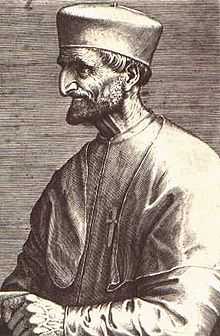Martín de Azpilcueta
Martín de Azpilcueta (Azpilicueta in Spanish) [1] (13 December 1491 – 1 June 1586), or Doctor Navarrus, was an important Spanish canonist and theologian in his time, and an early economist, the first to develop monetarist theory.

Life
He was born in Barásoain, Navarre, and was a relative of Francis Xavier. He studied at Alcalá and in France, and became professor of canon law at Toulouse and Cahors. Later, he returned to Spain and occupied the same chair for fourteen years at Salamanca, and for seven years at Coimbra in Portugal.
At the age of eighty he went to Rome to defend his friend Bartolomeo Carranza, Archbishop of Toledo, accused before the Tribunal of the Inquisition. Though he failed to exculpate the Archbishop, Aspilcueta was highly honoured at Rome by several popes, and was looked on as an oracle of learning and prudence. His humility, disinterestedness, and charity were proverbial.
He reached the patriarchal age of 95, and died at Rome. He is buried in the national Church of San Antonio de' Portoghesi. Among other lives of Azpilcueta there is one by his nephew, prefixed to the Roman edition of his works.
Works
His Manuale sive Enchiridion Confessariorum et Poenitentium (Rome, 1568) originally written in Spanish was long a classical text in the schools and in ecclesiastical practice. In his work on the revenues of benefices, first published in Spanish (Salamanca, 1566), translated into Latin (1568), and dedicated to Philip II of Spain and Pope Pius V, he maintained that beneficed clergymen were free to expend the fruits of their benefices only for their own necessary support and that of the poor.
He wrote numerous other works, e.g. on the Breviary, the regulars, ecclesiastical property, the jubilee year, etc. A complete edition of his works was printed at Rome in 1590 (3 vols. fol.); also at Lyons, 1590; Venice, 1602; and Cologne, 1615 (2 vols. fol.). A compendium of his writings was made by J. Dastellanus (Venice, 1598).
Time value of money
He allegedly invented the mathematical concept of the time value of money.
See also
- Doctrine of mental reservation
- Equivocation
- Tomás de Mercado another "Iberian monetarist"
References
- ↑ Aspilcueta, Azpilcoeta, Navarrus, Doctor Navarrus
- Giraud, Bibli. Sacr., II 334-336 (gives list of his writings)
- Hugo von Hurter, Nomenclator, (1892), I, 124-127
- Attribution
 This article incorporates text from a publication now in the public domain: Herbermann, Charles, ed. (1913). "Martin Aspilcueta". Catholic Encyclopedia. Robert Appleton Company.
This article incorporates text from a publication now in the public domain: Herbermann, Charles, ed. (1913). "Martin Aspilcueta". Catholic Encyclopedia. Robert Appleton Company.
|